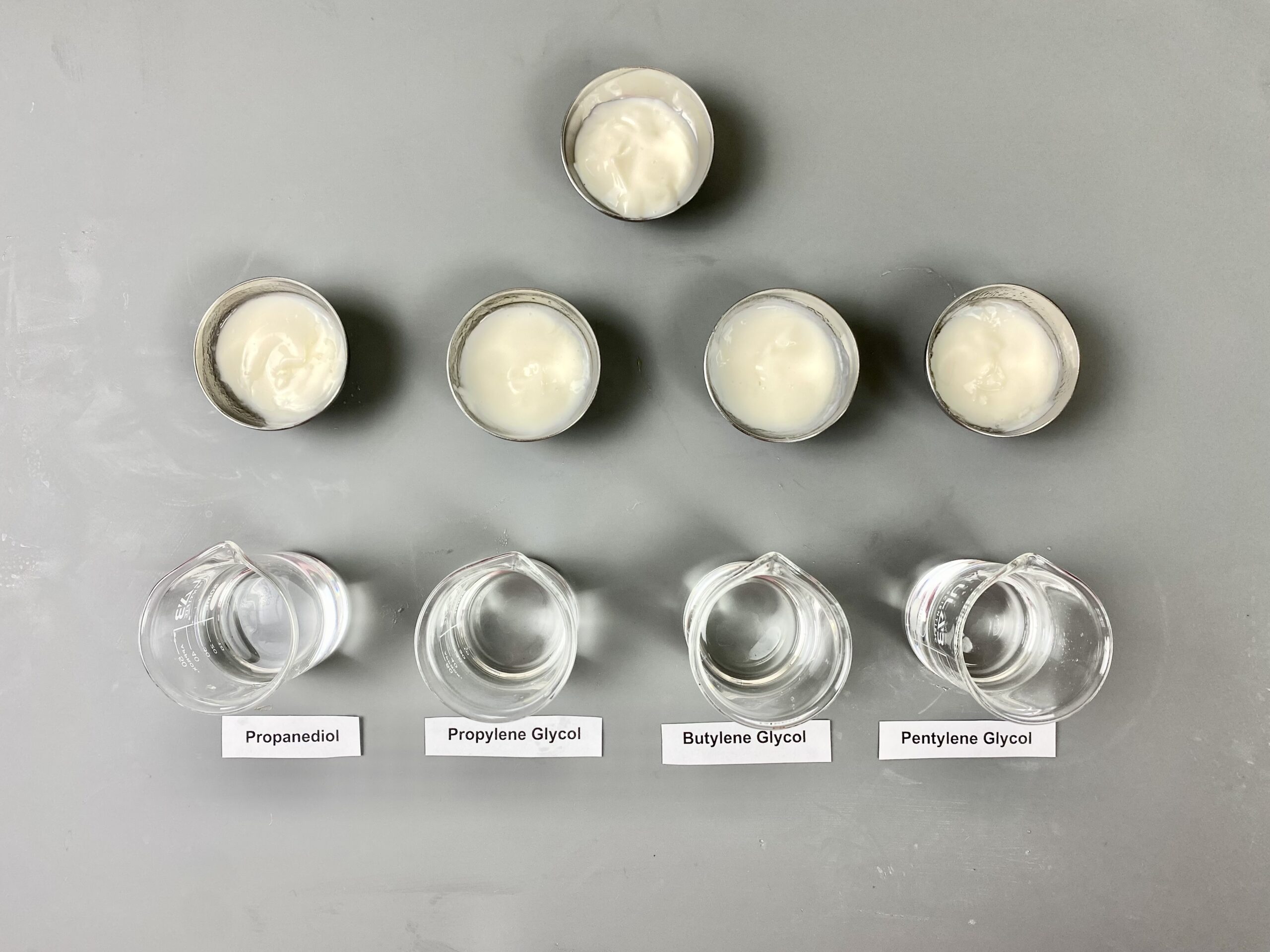
What are glycols?
Glycols are are used abundantly in the personal care industry, foods, and medicines. Glycols have been around for a long time, propylene glycol for over 100 years. They are traditionally produced by a petrochemical process from non-renewable feedstock of crude oil or natural gas. Acelaldehyde is extracted via distillation. Petro-derived glycols are not sustainable. Glycols play a large role in cosmetics and perform many functions in hair and skincare products. They function as humectants, emollients, solvents, preservative boosters, viscosity enhancers, skin penetration enhancers-carrier for active ingredients for delivery into the skin and hair. They improve the spreadability and sensory feel of formulations, add texture and a luxurious feel to formulations. They offer freeze-thaw stability.
What are natural glycols?
The need for natural glycols in cosmetic formulations is high and improve the impact on this world. In the last few years, glycols can now be sourced as natural glycols. These are sustainable and reduce the carbon footprint. They are produced through biotechnology using renewable feedstocks and fermentation like making wine. Sourcing a natural glycol, look for natural or bio or the renewable feedstock to ensure it is sustainable.
Propanediol
Propanediol is produced from a renewable feedstock, fermentation of sugars, non GMO corn sugar. It was introduced about 10 years ago and used as a natural replacement for propylene glycol. We have used propanediol since it was introduced and know the sensory feel and moisturization in formulations. It adds a silky feel and clarifies formulations. It is an excellent humectant for the skin and hair. Tests performed showed no skin irritation or sensitization, and improved skin moisturization. Propanediol boosts the preservative efficacy in formulations and reduces tackiness. It can be used for botanical extraction. Propanediol is liquid and water-soluble. Use in moisturizers, cleansers, skin care active products, sensitive skin, acne products, deodorant, baby care, shampoo, conditioner, and hair styling products.
Natural Propylene Glycol
Natural propylene glycol is produced from synthesis from bio-ethanol. Natural propylene glycol is hard to source in small purchase amounts. It’s used as a humectant, solvent, wetting agent to preventing water loss in products, binding agent, to decrease viscosity, and improve freeze-thaw stability
Natural Butylene Glycol
Natural butylene glycol is produced from a renewable feedstock, fermentation of sugars. non GMO corn sugar, 1,3 butylene glycol is natural occurring in avocado and coconut. Butylene glycol is available in small purchase amounts. It is a humectant, solvent, and reduces stickiness in formulations. It can be used to replace glycerin. It is a preservative booster. It can be used as a solvent and stabilizer for actives and extracts. It is colorless, faint odor, and water soluble. COSMOS approved and sustainable
Natural Pentylene Glycol
Natural pentylene glycol is produced from synthesis from renewable bagasse, a dry pulpy fibrous material remaining after the crushing of sugar cane. Pentylene glycol is available in small purchase amounts but is very expensive. It’s an excellent humectant and wetting agent and prevents water loss in the product and the skin. It is a solvent. It conditions skin and hair and is a skin penetration enhancer and increases permeability of active ingredients into the skin. It is emollient, lubricating, and has a nice sensory feel on the skin. It is water soluble, colorless, faint odor, and non-sticky. It can boost the preservation in a formulation. It can be used in place or in combination of glycerin to decrease tackiness in a formulation.
Brontide is a leader in producing sustainable Natural Butylene Glycol.
“We’re conscious of the environmental impact we make, from the farmland growing our sugar feedstock to the water used in our purification process. We carried out a life cycle assessment (ISO:14040:2006) to quantify our environmental impact compared to petroleum-based butylene glycol that was peer-reviewed by an independent panel. The impacts of Brontide natural butylene glycol are vastly lower.”
Learn more about their sustainability story and butylene glycol here.
You might also like

